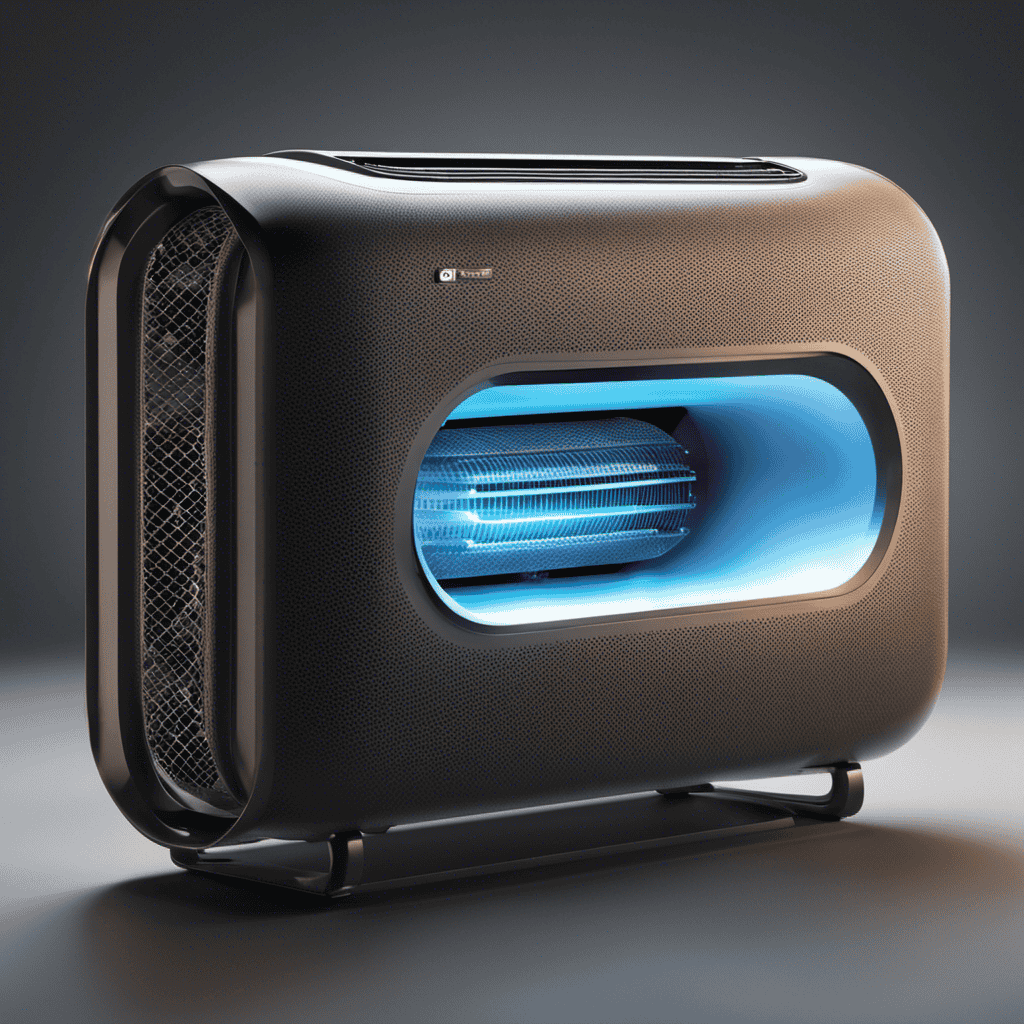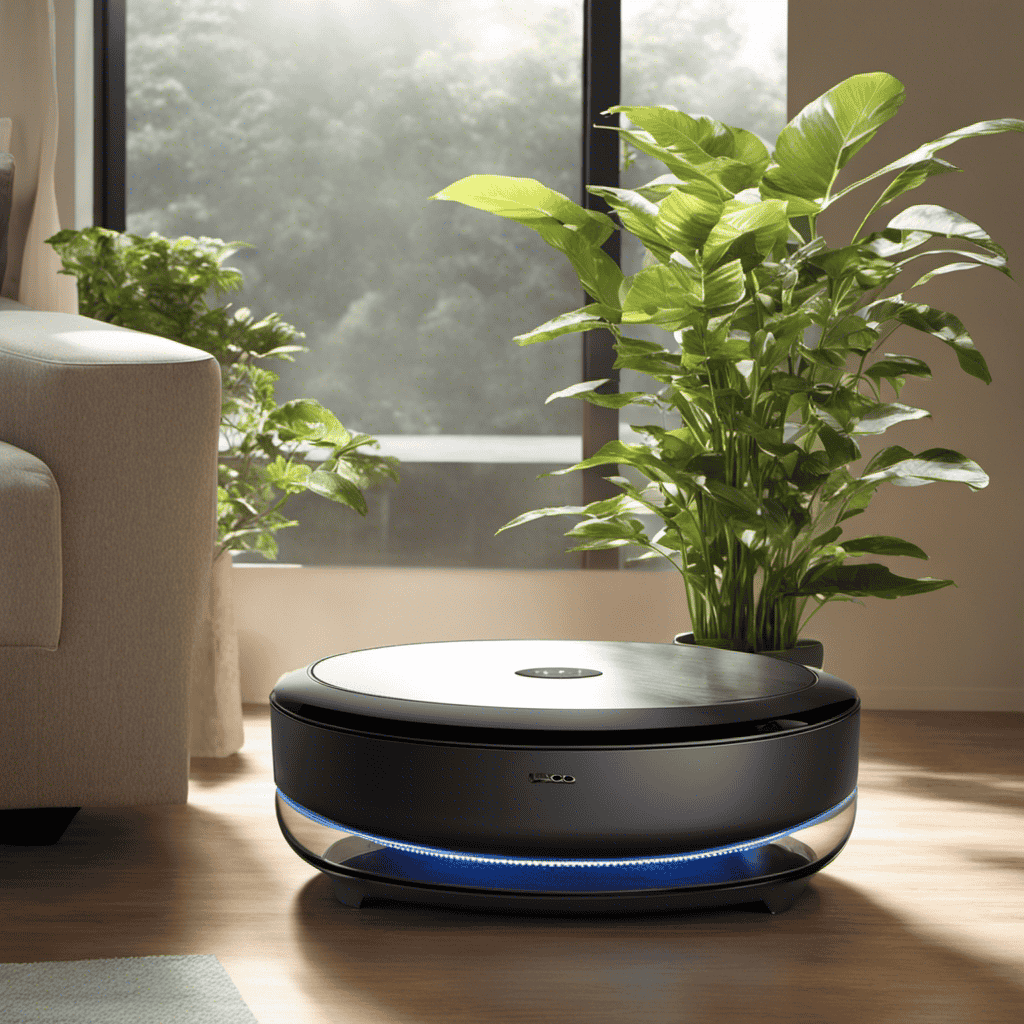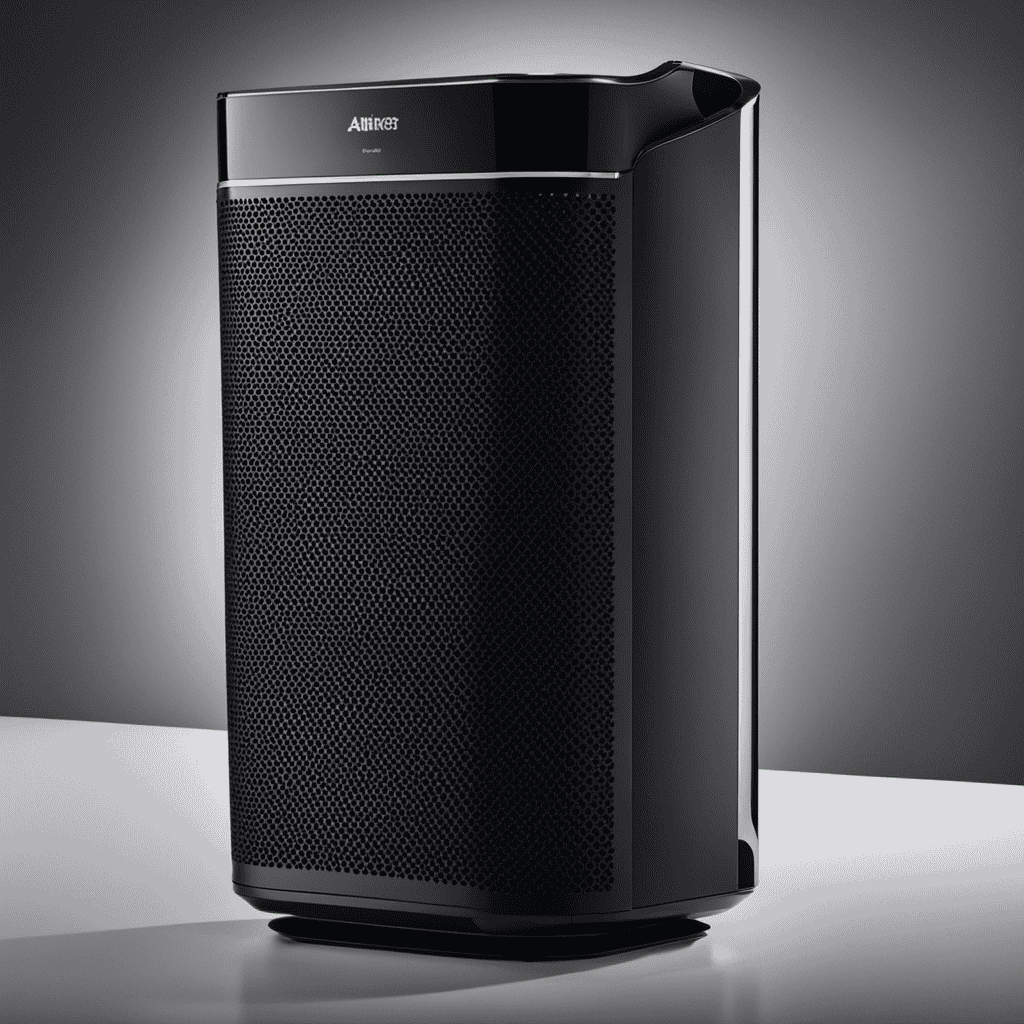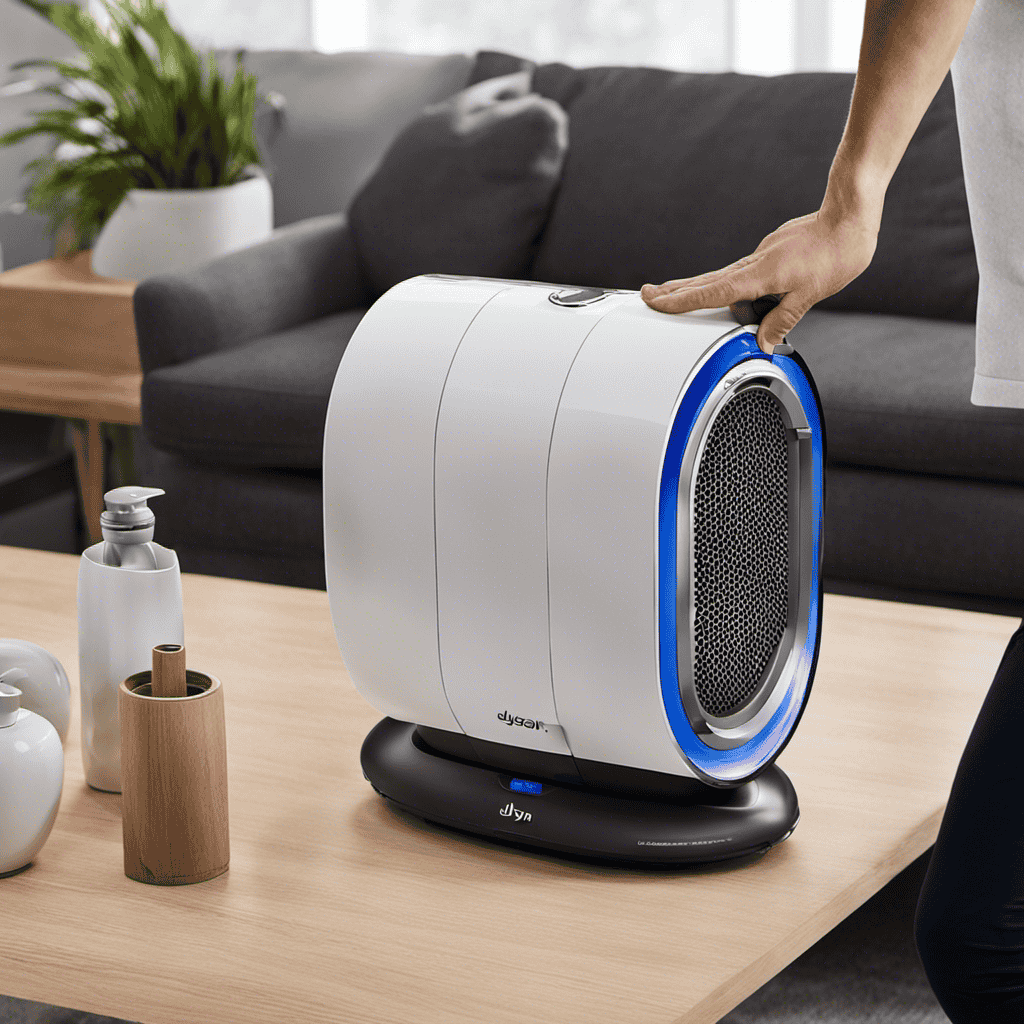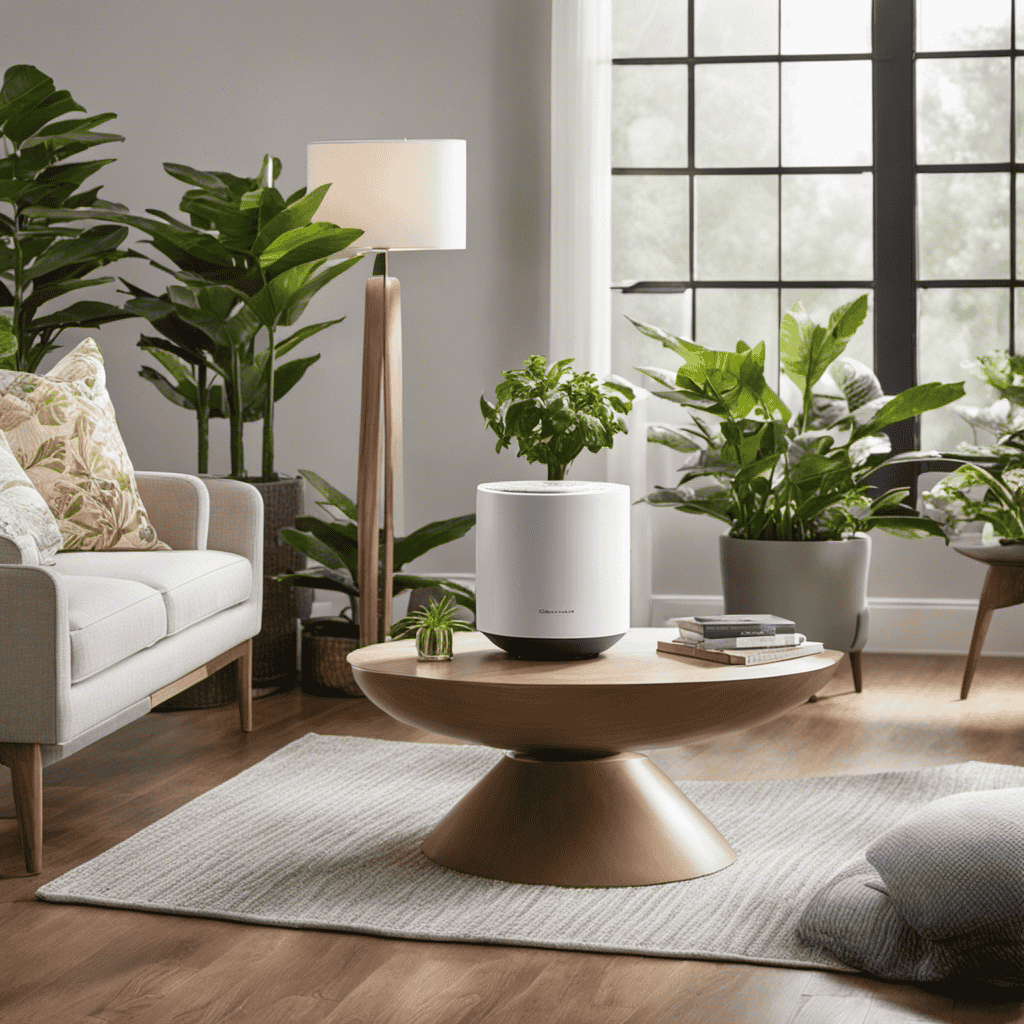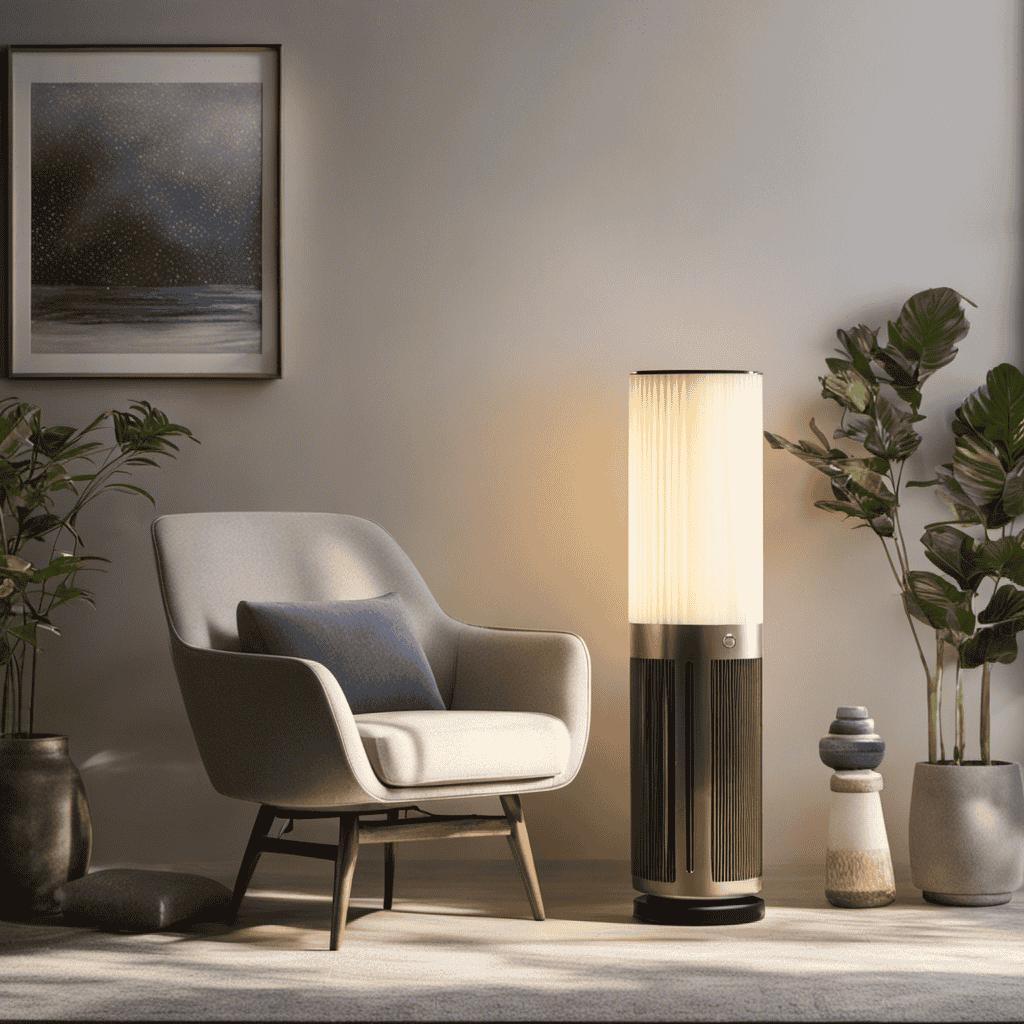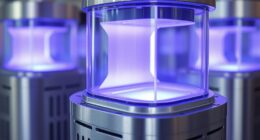When I entered my house and took a deep breath, I couldn’t ignore the intense plastic smell emanating from my air purifier.
Curiosity took hold, and I started to wonder why this was happening. In this article, I will explore the causes behind the plastic smell in air purifiers and delve into the potential health risks associated with it.
Additionally, I will provide tips on how to eliminate the odor and select an air purifier that minimizes such smells.
So, let’s dive in and uncover the secrets behind this peculiar fragrance.
Key Takeaways
- The plastic smell in air purifiers can be caused by heating of plastic components during operation and the emission of odor from plastic filters or housing.
- Prolonged exposure to certain plastic odors can cause respiratory irritation or allergies, and breathing in high levels of VOCs from plastic components can lead to health issues such as respiratory irritation, headaches, dizziness, and long-term effects on the central nervous system.
- Off-gassing of VOCs from air purifier materials, such as formaldehyde, benzene, and toluene, can occur and long-term exposure to high levels of VOCs can lead to respiratory irritation, allergies, and increased disease risk.
- To eliminate the plastic smell in air purifiers, it is important to regularly clean filters and casing, use activated carbon filters designed to remove odors and chemicals, keep the air purifier away from potential sources of plastic odors, and ensure proper ventilation in the room.
The Cause of the Plastic Smell
The cause of the plastic smell in your air purifier could be due to the heating of the plastic components during operation. When your air purifier is in use, the internal parts generate heat to effectively purify the air. This heat can cause the plastic components, such as the filters or housing, to emit a distinct odor.
The plastic smell is often considered an unusual odor and can be concerning for many users. It is important to note that while the plastic smell may be unpleasant, it is not necessarily harmful to your health. However, prolonged exposure to certain plastic odors can lead to respiratory irritation or allergies in some individuals.
If you find the plastic smell overpowering or persistent, it is recommended to contact the manufacturer or seek professional assistance to ensure the air purifier is functioning properly and safely.
Understanding Off-Gassing in Air Purifiers
To understand off-gassing in air purifiers, you may notice a plastic-like smell. Off-gassing refers to the release of volatile organic compounds (VOCs) from certain materials used in the construction of air purifiers. These VOCs can include chemicals like formaldehyde, benzene, and toluene, which can have potential health risks.
The plastic smell is often a result of these compounds being released into the surrounding air. While short-term exposure to these VOCs may not cause immediate harm, long-term exposure to high levels of these chemicals can have adverse effects on our health, including respiratory irritation, allergies, and even increased risk of certain diseases.
Therefore, it is important to be aware of the off-gassing risks associated with air purifiers and choose models that use materials with low VOC emissions.
Now, let’s explore the types of materials commonly used in air purifiers.
Types of Materials Used in Air Purifiers
You might notice a difference in the materials used in different air purifiers. The choice of materials can have a significant impact on the health benefits and environmental impact of the device.
Here are five common materials used in air purifiers:
-
Activated carbon: This material is excellent for trapping and removing odors, chemicals, and volatile organic compounds (VOCs).
-
HEPA filters: These high-efficiency filters can capture microscopic particles such as dust, pollen, pet dander, and mold spores, promoting better indoor air quality.
-
UV-C light: This type of light can kill bacteria, viruses, and mold spores, reducing the risk of respiratory infections.
-
Titanium dioxide: When activated by UV light, titanium dioxide can help break down harmful pollutants like formaldehyde and benzene.
-
Electrostatic precipitators: These devices use an electric charge to attract and capture particles, improving air quality.
Considering the materials used in an air purifier is crucial in maximizing its health benefits while minimizing its environmental impact.
How to Identify a Plastic Smell in Your Air Purifier
When it comes to the plastic smell in an air purifier, there are several potential causes that need to be considered. Understanding these causes is important because the smell can have health implications if it is due to the release of harmful chemicals.
Fortunately, there are also ways to eliminate the odor and ensure that your air purifier is functioning properly.
Causes of Plastic Smell
One possible answer is:
‘The plastic smell from your air purifier can be caused by factors such as newly manufactured components or overheating.’
The plastic smell can be concerning as it may have health effects and may indicate a potential issue with your air purifier.
To troubleshoot the plastic smell, consider the following tips:
-
Check if your air purifier is brand new: Newly manufactured components can emit a temporary plastic smell that should fade over time.
-
Ensure proper ventilation: Overheating of the air purifier can cause the plastic components to emit a strong odor. Make sure the air purifier has enough space around it for proper airflow.
-
Clean the filters: Accumulated dust and debris on the filters can create a plastic-like smell when the air purifier is running. Regularly clean or replace the filters as recommended by the manufacturer.
-
Use high-quality filters: Low-quality filters may release a plastic odor when in use. Invest in filters that are specifically designed for your air purifier model.
-
Contact customer support: If the plastic smell persists or is accompanied by other issues, reach out to the manufacturer’s customer support for further assistance.
Health Implications of Smell
The plastic odor emitted by the air purifier may have health implications if it is persistent or accompanied by other issues.
Breathing in strong plastic odors can potentially cause respiratory irritation, headaches, and nausea. Prolonged exposure to these odors may also lead to long-term health effects such as respiratory problems, allergies, and asthma.
In addition to the physical health risks, the psychological effects of the smell can also be significant. Persistent plastic odor can cause discomfort, stress, and even anxiety, especially for individuals who are sensitive to smells.
It is important to address the issue promptly to prevent any further health complications. Now, let’s explore how to eliminate the plastic odor and ensure the air purifier provides the intended health benefits.
How to Eliminate Odor
To eliminate the odor, you should try cleaning the filters and using odor-absorbing materials in the room where the air purifier is located.
Air purifier filters can accumulate dust, dirt, and other particles over time, resulting in unpleasant odors. Cleaning the filters regularly ensures that the air purifier functions optimally and reduces any potential odor.
Additionally, using natural odor neutralizers can help eliminate unwanted smells in the room. Here are some effective options to consider:
- Activated charcoal: Known for its ability to absorb odors, activated charcoal can be placed near the air purifier to help neutralize any lingering smells.
- Baking soda: Sprinkling baking soda in the room helps absorb and eliminate odors.
- Essential oils: Adding a few drops of essential oils, such as lemon or lavender, to the air purifier or a diffuser can help mask unpleasant smells.
- Vinegar: Placing a bowl of vinegar in the room can help absorb and neutralize odors.
- Fresh air: Opening windows and allowing fresh air to circulate can help remove any lingering smells.
Potential Health Risks of a Plastic Smell in Your Air Purifier
There’s a potential health risk associated with a plastic smell in your air purifier. Identifying this smell is crucial to ensure the safety of your indoor air quality.
The presence of a plastic odor in your air purifier may indicate the release of harmful chemicals, such as volatile organic compounds (VOCs). These chemicals can be emitted from the plastic components of the device, such as the casing or filters. Breathing in high levels of VOCs can lead to various health issues, including respiratory irritation, headaches, dizziness, and even long-term effects on the central nervous system.
If you detect a strong plastic smell coming from your air purifier, it is advisable to discontinue use and consult the manufacturer for guidance.
Regular maintenance, proper ventilation, and choosing air purifiers made with low or no VOC materials are important steps in preventing potential health risks associated with a plastic smell.
Tips for Eliminating the Plastic Smell in Your Air Purifier
If you want to eliminate the plastic smell in your air purifier, try cleaning the filters and casing regularly. This will help remove any accumulated dust or debris that may be causing the odor.
Additionally, consider the following tips to further improve the air quality in your home:
-
Use activated carbon filters: These filters are specifically designed to remove odors and chemicals from the air.
-
Keep the air purifier away from potential sources of plastic odors, such as new furniture or plastic containers.
-
Avoid using harsh cleaning products near the air purifier, as the chemicals can react with the plastic and create a smell.
-
Ensure proper ventilation in the room where the air purifier is located to prevent the buildup of stagnant air and odors.
-
Replace the filters as recommended by the manufacturer to maintain the efficiency of the air purifier and prevent potential health risks caused by exposure to pollutants.
Common Mistakes That Can Result in a Plastic Smell
One common mistake that can result in a plastic smell is not properly cleaning the filters and casing of your air purifier.
Over time, dust, dirt, and other particles can accumulate on the filters and inside the casing, leading to off-gassing and unpleasant odors.
To prevent this, it is important to regularly clean and maintain your air purifier. Start by checking the manufacturer’s instructions for cleaning guidelines specific to your model.
Typically, this involves removing and cleaning the filters with water or a mild detergent, and wiping down the casing with a damp cloth.
Additionally, consider using air purifier filters with activated carbon, which can help absorb and eliminate odors more effectively.
Regular maintenance and off-gassing prevention measures will ensure that your air purifier functions optimally and remains odor-free.
Choosing an Air Purifier With Minimal Odor
When selecting an air purifier, it’s essential to choose a model that has minimal odor. This is crucial for maintaining a fresh and clean indoor environment.
To ensure your air purifier has minimal odor, consider the following factors:
-
Filter material: Opt for an air purifier with a high-quality filter material, such as activated carbon or HEPA filters, which are known for their ability to trap and remove odors effectively.
-
Filtration efficiency: Look for an air purifier that has a high filtration efficiency, capable of capturing small particles and pollutants that can contribute to odors.
-
Air purifier technology: Consider air purifiers with advanced technologies like ionization or photocatalytic oxidation, which can help neutralize odors.
-
Maintenance: Regularly clean and replace the air purifier filter to prevent the buildup of odor-causing particles.
-
User reviews: Read user reviews to get insights into the effectiveness of the air purifier in minimizing odors.
Maintenance and Cleaning to Prevent Plastic Smells
Regularly cleaning and maintaining your air purifier can help prevent any unpleasant plastic smells from developing.
Proper maintenance is crucial in ensuring the optimal performance and longevity of your air purifier. To prevent plastic smells, start by turning off the device and unplugging it from the power source.
Carefully remove the filters and clean them according to the manufacturer’s instructions. Use a soft brush or vacuum to remove any dust or debris from the exterior and vents. Wipe the surfaces with a damp cloth and mild detergent, ensuring to dry them thoroughly before reassembling.
Additionally, consider replacing the filters as recommended by the manufacturer. By following these maintenance tips and cleaning techniques, you can keep your air purifier smelling fresh and free from any plastic odors.
Frequently Asked Questions
How Much Does an Air Purifier Typically Cost?
Oh, the joys of owning an air purifier! They can range in cost, depending on the features you desire. Don’t forget about maintenance costs too, like replacing filters regularly. It’s all worth it for that fresh, clean air.
Can a Plastic Smell From an Air Purifier Be Harmful to Pets?
A plastic smell from an air purifier can be harmful to pets. It may indicate the presence of volatile organic compounds (VOCs), which can cause respiratory issues. To prevent this, choose an air purifier with a HEPA filter and avoid using plastic materials that emit strong odors.
Are There Any Air Purifiers That Don’t Produce Any Smell at All?
Yes, there are air purifiers that do not produce any smell at all. Regular air purifier maintenance, such as cleaning or replacing filters, can help reduce odors. Additionally, choosing air purifiers with low noise levels can improve indoor air quality without any unwanted smells.
Can a Plastic Smell in an Air Purifier Affect the Effectiveness of the Purifier?
A plastic smell in an air purifier can potentially affect its effectiveness. It may indicate the presence of harmful chemicals or pollutants. It is important to address the issue to ensure a safe and efficient air purification process.
Are There Any Specific Brands or Models of Air Purifiers Known for Having a Plastic Smell?
After extensive research, I found that certain specific brands and models of air purifiers are known for having a plastic smell. However, it is important to note that prolonged exposure to this smell may have potential health effects.
Conclusion
In conclusion, understanding the cause of a plastic smell in your air purifier is essential for maintaining a healthy indoor environment. Off-gassing from materials used in air purifiers can release volatile organic compounds (VOCs) that may pose risks to your health.
It is important to identify and eliminate the plastic smell to prevent any potential health issues. Interestingly, a study conducted by the Environmental Protection Agency found that indoor air can be up to five times more polluted than outdoor air, emphasizing the importance of using air purifiers effectively.
Regular maintenance and cleaning, as well as choosing air purifiers with minimal odor, can help ensure a fresh and clean indoor atmosphere.
